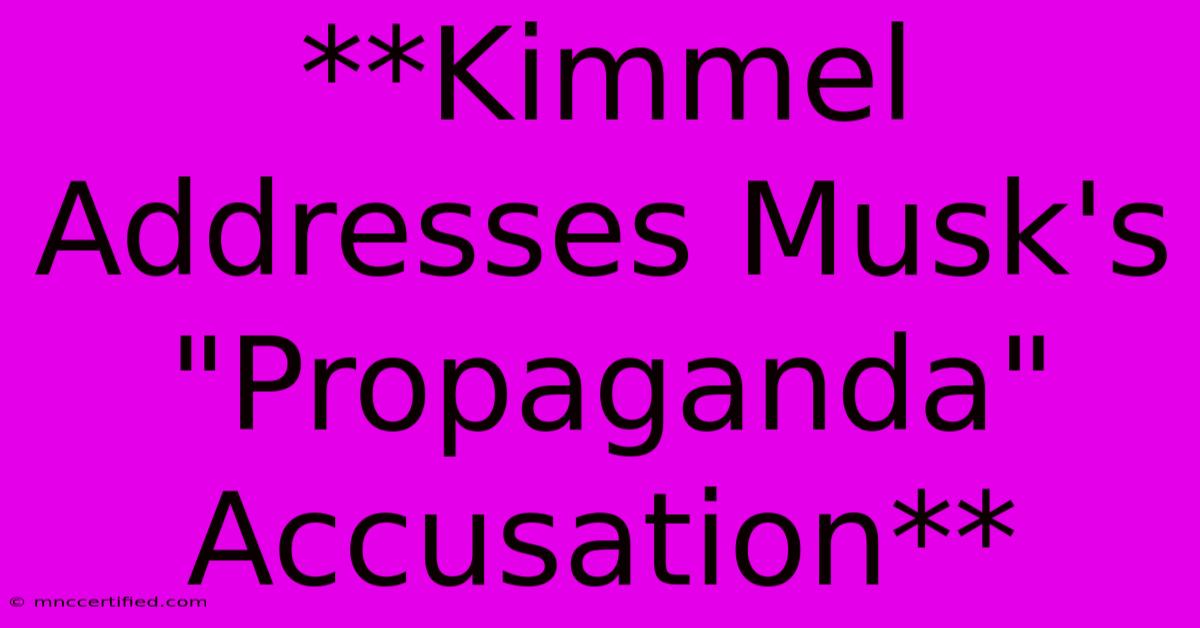**Kimmel Addresses Musk's "Propaganda" Accusation**

Table of Contents
Kimmel Addresses Musk's "Propaganda" Accusation: A Comedy Show Takes a Serious Turn
Late-night comedian Jimmy Kimmel found himself at the center of a Twitter storm this week after Elon Musk accused him of spreading "propaganda" on his show. The controversy sparked debate about media bias, free speech, and the role of comedians in the current political climate.
The Accusation and the Response
The initial spark was a segment on "Jimmy Kimmel Live!" where Kimmel satirized Musk's decision to reinstate former President Donald Trump's account on Twitter. In the segment, Kimmel mocked Musk's claim that he was "a free speech absolutist," highlighting the irony of allowing Trump back on the platform.
Musk responded swiftly, calling Kimmel's segment "propaganda" and accusing him of "spreading lies." He further argued that Kimmel was "not a journalist" and that his show was "a comedy show, not a news program."
Kimmel, known for his sharp wit and political commentary, didn't hold back. He responded to Musk's accusations on his show, saying, "I'm just a comedian, Elon. I make jokes. And sometimes, those jokes are about billionaires who buy social media companies and then do things that seem to benefit themselves."
Free Speech vs. Accountability: A Complex Debate
The exchange between Kimmel and Musk ignited a heated debate about free speech and the responsibility of media outlets.
Proponents of free speech argued that Musk was right to criticize Kimmel for spreading "propaganda" and that comedians shouldn't be exempt from accountability for their words. They pointed out that Kimmel's segment could be seen as biased and designed to influence public opinion.
Advocates for media freedom countered that Kimmel's segment was clearly satire and should be interpreted as such. They argued that Musk was trying to stifle criticism by labeling it "propaganda" and that this was a dangerous trend.
The Role of Comedy in the Age of Information
The controversy also raised important questions about the role of comedy in the current political landscape. Comedians have long served as social commentators, using humor to expose hypocrisy and challenge authority.
However, in the age of social media, where information spreads rapidly and often unchecked, the line between satire and propaganda can blur.
This is where it becomes crucial for viewers to critically evaluate the information they consume and be aware of the potential biases of even seemingly comedic content.
What Does the Future Hold?
The Kimmel-Musk exchange is likely just the beginning of a larger conversation about the role of media, comedy, and social media in shaping public discourse.
As we move forward, it's important to remember that freedom of expression is essential, but it comes with a responsibility to use our voices thoughtfully and critically.
Ultimately, it's up to each individual to determine what they consider to be "propaganda" and to cultivate their own critical thinking skills to navigate the increasingly complex landscape of online information.

Thank you for visiting our website wich cover about **Kimmel Addresses Musk's "Propaganda" Accusation**. We hope the information provided has been useful to you. Feel free to contact us if you have any questions or need further assistance. See you next time and dont miss to bookmark.
Featured Posts
-
My Ps 5 Pro Review 7 Must Play Enhanced Games
Nov 08, 2024
-
Best Motorcycle Insurance North Carolina
Nov 08, 2024
-
How To Use Bondo Glazing And Spot Putty
Nov 08, 2024
-
Shetland Back On Track After Jensen Takeover
Nov 08, 2024
-
Outer Banks Season 4 Finale Explained
Nov 08, 2024